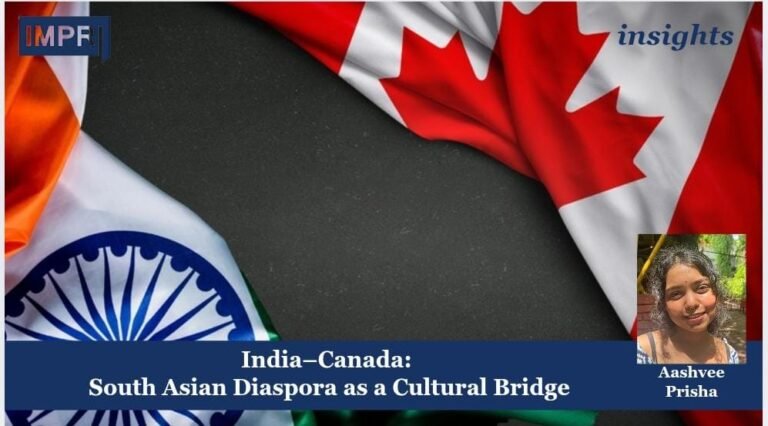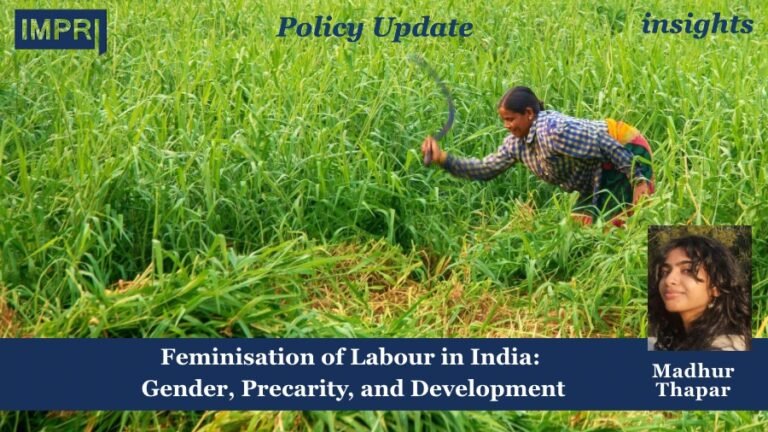Policy Update
Riya Rawat
Global finance is no longer confined to traditional powerhouses. As economies evolve and capital moves across borders with unprecedented speed, countries are reimagining how they participate in this dynamic landscape. For India, a nation with one of the fastest-growing economies and a vibrant digital ecosystem, stepping into the global financial arena was not just an aspiration—it became a necessity.
This vision materialized through the creation of the Gujarat International Finance Tec-City (GIFT City) and the establishment of the International Financial Services Centres Authority (IFSCA). Together, they represent India’s commitment to offering a financial hub that is competitive, forward-looking, and aligned with global standards. But beyond competition, there is a deeper ambition: to redefine what a financial centre can be—rooted in sustainability, inclusivity, and excellence. Prime Minister Narendra Modi’s words capture this intent clearly when he described GIFT City as a zone designed to serve not just India, but the world.
Source: the GIFT City Masterplan Booklet
For decades, Indian financial institutions and corporations relied on offshore centres like Singapore or Dubai to conduct international transactions. The absence of a domestic alternative meant opportunities were consistently routed through foreign jurisdictions. With GIFT City and IFSCA, India has begun to reclaim this space, offering a platform where global financial services can thrive within its borders.
Building the Framework: From Vision to Regulation
The journey towards establishing an international financial hub in India was not spontaneous. It was shaped by years of policy deliberation, beginning with the SEZ Act of 2005, which provided the legal basis for creating specialized economic zones. Yet, as the complexities of global finance grew, it became clear that piecemeal regulation would not suffice. The establishment of the IFSCA through the 2019 Act marked a decisive response to this challenge.
By bringing together regulatory powers that were previously divided among multiple agencies—RBI, SEBI, IRDAI, and PFRDA—IFSCA introduced clarity and cohesion. This unified approach was critical for creating an environment where international financial institutions could operate without navigating fragmented rules. It also reflected a shift in mindset: from regulating in isolation to enabling growth within a globally integrated framework.
IFSCA’s mandate extends beyond oversight. It is equally tasked with nurturing innovation, encouraging new financial products, and ensuring that India’s IFSCs remain adaptable in a world where financial norms are constantly evolving.
GIFT City: More Than a Financial Centre
Source: the GIFT City Masterplan Booklet
Positioned between Ahmedabad and Gandhinagar, GIFT City is more than a collection of office spaces or financial institutions. It is the embodiment of India’s ambition to build a financial ecosystem that reflects modern values. The city’s design speaks to this—energy-efficient buildings, pollution-free zones, and infrastructure that encourages collaboration and growth.
Its location offers strategic advantages, connecting seamlessly to major transport hubs, while its governance model brings together key state agencies to ensure smooth operations. But perhaps what sets GIFT City apart is its foundation on principles often overlooked in financial hubs: sustainability, transparency, and inclusivity.
This is not a centre built solely for transactions; it is designed as a space where global businesses can engage in responsible growth, supported by a regulatory environment that encourages innovation without compromising stability.
A Regulatory Approach That Encourages Growth
IFSCA’s role within GIFT City is distinctive. It does not merely enforce compliance—it creates conditions where financial services can expand in ways that are secure, transparent, and future-ready. Whether it is the launch of India’s first International Bullion Exchange, frameworks for aircraft leasing, or regulatory sandboxes that allow fintech companies to experiment safely, IFSCA has demonstrated an understanding that regulation and development must go hand in hand.
At the same time, the authority has maintained a strong focus on safeguarding market integrity. Its detailed guidelines on anti-money laundering and counter-terrorism financing reflect a commitment to ensuring that GIFT IFSC operates on par with leading global centres in terms of trust and credibility.
This balance—between fostering innovation and maintaining robust oversight—is what gives IFSCA its distinctive character among financial regulators.
Why GIFT City Attracts Global Interest
Source: the GIFT City Masterplan Booklet
What makes GIFT IFSC particularly attractive to international investors and institutions is not just its regulatory clarity but also the carefully structured fiscal incentives that underpin its operations.
Companies setting up within GIFT IFSC benefit from a decade-long income tax exemption, flexibility in choosing their tax holiday period, and relief from transaction taxes that often erode profitability in other jurisdictions. The reduced Minimum Alternate Tax (MAT) rate and exemptions on capital gains for non-residents further enhance its appeal. By removing layers of cost typically associated with cross-border finance, GIFT City positions itself as a serious alternative to established offshore centres.
In addition, exemptions from FEMA regulations simplify foreign exchange dealings, while state-led subsidies support technological investments and workforce development. This combination of regulatory ease and fiscal advantage is not commonly found, even in long-standing financial hubs.
Challenges in a Competitive Global Landscape
Of course, establishing a presence on the global financial stage comes with its set of challenges. Centres like Singapore and London have had decades to build deep liquidity, trusted legal systems, and a network of global participants. GIFT City is still in its growth phase, working to attract the critical mass of players that defines a thriving financial hub.
There is also the ongoing task of keeping pace with rapidly evolving financial technologies and instruments. Digital assets, decentralized finance, and ESG-linked investments are reshaping global markets. For IFSCA, this means remaining agile—ready to update frameworks, engage with international partners, and anticipate shifts rather than react to them.
Talent acquisition presents another hurdle. Competing for skilled professionals in finance, law, and technology requires not only competitive incentives but also the creation of an ecosystem where global talent sees long-term opportunity.
Where Opportunity Meets Vision
Despite these challenges, GIFT City’s potential is unmistakable. India’s strong digital infrastructure, its leadership in fintech, and a growing emphasis on green finance position it uniquely among emerging financial centres. IFSCA’s proactive steps in promoting sustainable finance frameworks, coupled with India’s broader climate commitments, align perfectly with global investor sentiment, which increasingly favours responsible investment destinations.
The focus is no longer just on replicating what other IFSCs have done but on offering something distinct—an ecosystem where profitability aligns with purpose, where technology drives efficiency, and where sustainability is embedded in every layer of operation.
Looking Ahead
Recent initiatives reflect a momentum that is hard to ignore. The operational success of the bullion exchange, strides in integrating fintech innovations, and active engagement with international regulatory bodies suggest that GIFT City and IFSCA are not content with incremental progress. There is a clear intent to position India not just as a participant but as a thought leader in global finance.
Source: the GIFT City Masterplan Booklet
As the landscape of international financial services shifts—driven by technology, sustainability concerns, and geopolitical realignments—India’s approach through GIFT City offers a fresh perspective. It is a model that balances ambition with responsibility, growth with governance.
Conclusion
GIFT City and IFSCA represent more than policy achievements; they signal a reimagining of India’s role in global finance. This is a story of reclaiming financial flows that once bypassed the country, of creating opportunities for international businesses to engage with India in ways that are efficient, transparent, and forward-looking.
The foundation has been laid, but the journey is ongoing. Success will depend on how effectively India continues to adapt, innovate, and communicate its unique value proposition to the world. Yet, with the frameworks, vision, and momentum already in place, GIFT City stands as a testament to what is possible when regulation, infrastructure, and ambition converge with clarity of purpose.
References
GIFT City. (n.d.). About us. Retrieved April 25, 2025, from https://giftgujarat.in/about-us
GIFT City. (n.d.). GIFT City brochure: Tool guides for setting up business. Retrieved April 25, 2025, from https://api.giftgujarat.in/public/tool-guiedes-for-setting/GiftCityBrochure.pdf
International Financial Services Centres Authority. (n.d.). Official website. Retrieved April 25, 2025, from https://www.ifsca.gov.in
International Financial Services Centres Authority. (2019). The International Financial Services Centres Authority Act, 2019.
International Financial Services Centres Authority. (2023). Annual report 2023–2024.
International Financial Services Centres Authority. (2022). Anti-Money Laundering, Countering Financing of Terrorism, and Know Your Customer Guidelines, 2022
Insurance Regulatory and Development Authority of India. (2017). Registration and operations of IFSC insurance offices guidelines.
International Financial Services Centres Authority. (2021). Operations of IFSC insurance intermediary offices guidelines.
Livemint. (2018, October 10). What is an IFSC and how does it work? Mint. Retrieved from https://www.livemint.com/Industry/XmEtCCZklNL5w0LmQ9K7lJ/What-is-an-IFSC-and-how-does-it-work.html
Arthapedia. (n.d.). International Financial Service Centre (IFSC). Retrieved April 25, 2025, from http://www.arthapedia.in/index.php/International_Financial_Service_Centre_(IFSC)
Business Standard. (2025, March 26). GIFT City climbs Global Financial Centre Index, bolsters its hub status. Business Standard. Retrieved from https://www.business-standard.com/economy/news/gift-city-climbs-global-financial-centre-index-bolsters-its-hub-status-125032600948_1.html
About the Author– Riya Rawat is a researcher at the Impact and Policy Research Institute (IMPRI), pursuing a second master’s degree in Political Science. With a strong background in public policy, gender studies, and international relations, her research interests focus on policy development, analysis, and global affairs.
Acknowledgement– The author extends sincere gratitude to Dr. Arjun Kumar and Aasthaba Jadeja for their invaluable guidance and support.
Disclaimer: All views expressed in the article belong solely to the author and not necessarily to the organisation.
Read more at IMPRI:
Canada After Trudeau: Carney’s Coalition, Trump’s Shadow, and India’s Opportunity
The Silent Gaps: Why Maternal Mortality Decline Isn’t the Whole Story



